What Not to Say
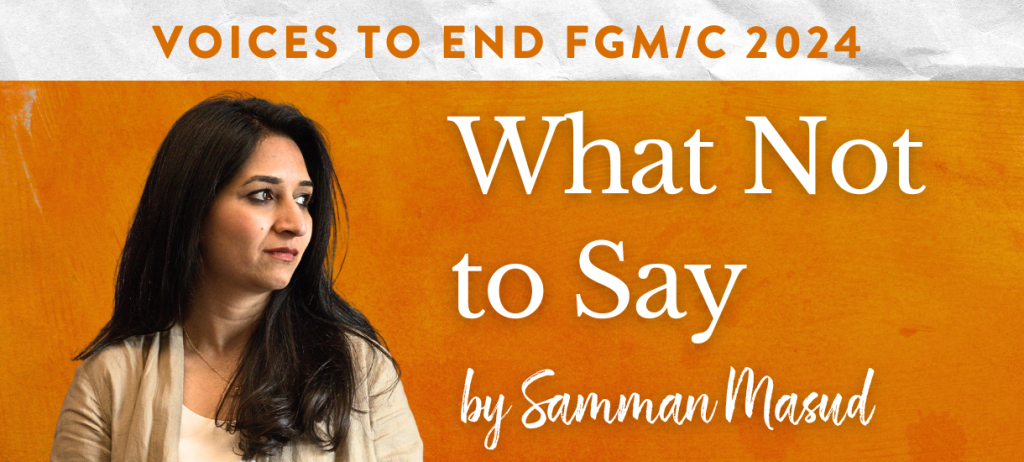
By; Samman Masud In this digital short film, “What Not to Say”, I wanted to take the opportunity to talk about the experiences and conversations I had with my community members around the time I gave birth to my two wonderful daughters. To some, these experiences would not necessarily qualify as microaggressions, nor are they typical cases of gender-based violence, but these discourses warrant a much needed conversation and intervention within the Pakistani and South Asian community at large, where misogyny and patriarchal norms are alive and well. In this film I discuss the discomfort I felt when some friends or distant relatives made comments about my second child being yet another daughter. “Do you think it’s going to be a boy this time?” and “Are you going to try for a boy next time?” were questions passed to me very nonchalantly, and although they were meant to be and might even seem like harmless little exchanges, in reality they have the potential for some far reaching and serious implications for women and girls already living in a world laden with gender-based violence. These casual conversations that dismiss the birth of one’s daughter have even bigger impacts in South Asian communities, where the normalization of such denigrating language against an already marginalized group can worsen their conditions, if not change them for the better. We know that the preference for male children throughout societies in the international community stems from various religious, cultural, socio-economic realities, but the progress made over the years in the women’s right to work which gave them financial autonomy is shifting the tide and conversation around son-preference, somewhat, as I’ve noticed in my close circle and amongst families of my relatives in Pakistan. A completely accurate analysis of the current global trends in this practice could only be assessed through an in-depth qualitative and quantitative study that I’d love to undertake one day. Yet, despite the progress made in women and girls’ conditions around the world, cultural practices like son-preference remain deep-rooted, difficult to eradicate and have grave consequences for women and girls. I believe that the first step to protecting women and girls can begin at home, where we can disrupt the slightest, subtle conversations that give preferential treatment to male children and men. The opportunity to participate in this storytelling workshop allowed me to discuss this topic that may not seem harmful at the outset, but is in fact part and parcel of the larger problem of gender-based violence. I am lucky to have grown-up in a family where my sister and I were loved and treated equally as our brother, and so was the case for my cousins and friends. But growing up within a South Asian community, I could not ignore the prayers and blessings women gave to expectant mothers about giving birth to a son. I had heard of secret abortions of girl children that took place in India and Pakistan, but a women and gender studies course that looked at an in-depth study of sex-selective abortions among college educated Indian American women in the U.S. blew my mind. Of course I had seen gut-wrenching documentaries with the disturbing stats on the number of girls missing from the world due to the infanticide and femicide epidemic across rural populations. But this revelation of educated women’s preference for sons due to whatever socio-economic backdrops and discourses around feminist agency reasoning was eye-opening. So during my second pregnancy, I wasn’t surprised when some educated women around me casually asked whether I would try for a boy next time. I’ve learned through these exchanges that degrees from institutions do little to disrupt archaic ideas through which practices like gender-based abortions, or female genital cutting are allowed to continue. Instead, community education and public awareness can bring incremental change and eventually end them. This workshop allowed me to do just that and hopefully will raise awareness about an issue through a storytelling medium that truly has a transformative potential and one I love so much. [youtube url=”https://youtu.be/QZGUVi76GMU”] Samman Masud serves as the Community Engagement Coordinator at Sahiyo, where her responsibilities include overseeing the Activists Retreat Program and spearheading the male engagement initiative focused on educating and raising community awareness about female genital cutting. Her background features extensive engagement in human rights advocacy, including roles within the strategic communications department and participation in human rights for youth campaigns at Amnesty International USA. Samman holds a B.A. in Political Science and a Master’s in Human Rights and Women & Gender Studies, reflecting her deep academic and practical interest in advancing gender equality and human rights.
Not Who I Am
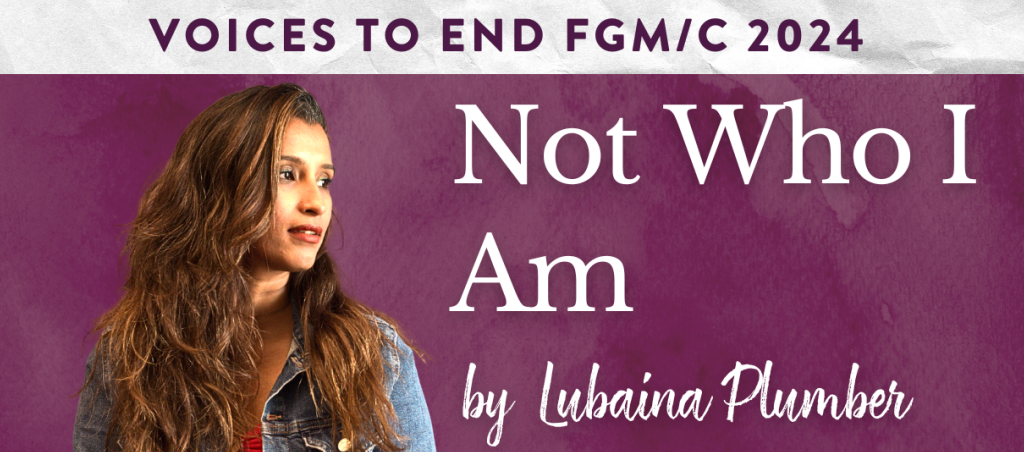
By; Lubaina Plumber Why did you want to attend the workshop and share your story? So, to me it was a natural next step when I was given the opportunity to be part of the Voices Workshop. I’ve worked in gender based violence my whole life and as a survivor myself it’s important to share my story. I wanted to take my advocacy forward, and while I’ve been vocal about FGC in writing and in closed circles, never have I shared this story quite so publicly, in a video format. It was also a way to share my story with more people in a bite-sized way. Another reason why I wanted to share my story and attend the workshop was because I wanted to meet more people who were doing the same type of work I was. I met a lot of people that I wouldn’t have, had I not attended the workshop. That was a huge driving force for me to attend. What story did you choose to tell and turn into a digital story? I chose to focus on the aspect of sexual pleasure and your relationship with your body and how FGC affects those things. When I was younger, the impact was immensely emotional and psychological, but during my journey as I learned more I realized how the practice impacts the way you feel not just emotionally but sexually, physically, and physiologically too. I talked about having to accept that your body is different, and that you’ll never really know what and how it could’ve been if you weren’t cut. I was always told that FGM/C was done to curb women’s pleasure. I learned from the Activists Retreat that you actually can go to a doctor in the United States and ask them to tell you what’s different, how your body has changed, and that was a wild possibility to me. Women’s bodies and sexuality have been and are being controlled and repressed for centuries, and the fact that so many communities practice FGC to uphold that misogynistic ideology is gut wrenching and needs to stop! What have you learned or most enjoyed during what workshop by meeting others who also share their stories? The thing I enjoyed the most was being able to be present in the same space with the other participants and be in-person with them. I really enjoyed the pre-sessions where we all got to meet each other and talk beforehand. I think that made me feel more comfortable –to be able to share my story in that space with people I had a common understanding with was really powerful. We all became close friends through the workshop, getting to work on our stories and videos together throughout the process, and then getting to watch them together at the end – I think that was the highlight for me, I felt like I didn’t have to work in isolation. A crucial part of advocacy is solidarity. I’ve always had allies in my close friends and some family but to have a whole group of people who truly understand your journey because they have a story too and are vulnerable enough to share it with you is just beyond powerful and heartwarming. You feel heard, safe, understood, and held. I feel immensely grateful to share space with those I met at the workshop. What kind of impact would you like your story to have? I’m interested in sharing my digital story with my wider circle. I usually don’t send people my articles and things like that, unless it’s to my parents or close friends. But this I want everyone to see, and I want to be loud about it. I hope that once I show it to people it makes them want to be loud about FGC, women’s rights, and sexual pleasure too. I hope it inspires people to really think about their relationship with their own body and their sexual well-being. I also hope it inspires people to speak out against FGC. Is there anything in your digital story that you would like to share? I want to highlight that as a child and a young survivor we deserve protection because we did not know better. And only now as grown women we are using our voices to try and stop these terrible things from happening. So I want people to know that. [youtube url=”https://youtu.be/ivMmdlvpgzY”] Lubaina Plumber is passionate about driving social change through public policy and human rights law work. Outside of work, she loves spending time with interesting people, uncovering hidden gems while traveling, diving into gripping books and podcasts, and nurturing her garden.
Support
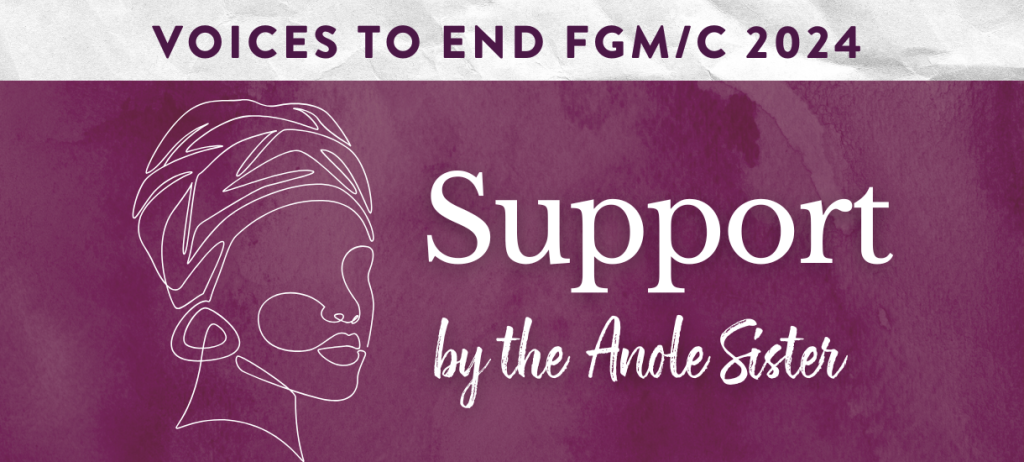
By The Anole Sister Being an Anole Sisters member, I am an FGM/C survivor. For the past four decades, I have lived with this experience. Since 2015, I have been advocating for and raising awareness about FGM/C along with other survivors, women, and girls at risk. However, I had never shared my story publicly until I joined the Sahiyo Voices to End FGM/C workshop in 2024. At the workshop, I created a video and shared a story from my childhood that had been buried deep within me. This act of sharing not only inspired me but also resonated with many in the audience, breaking a long-held silence. Now, I feel much more empowered to encourage others to share their stories, to let go, and to continue advocating against FGM/C. I used to be nervous about sharing my story with other people, but not anymore. I love my story, that’s why I chose to tell it and attend the workshop. I also wanted to attend the workshop so that I could hear other people’s stories, and so that we could learn from each other. I want my story to bring awareness to the issue and to the community. I also want people who don’t know about the practice to learn more about FGM/C, so more people might share stories that are similar to mine. In this workshop, I really enjoyed learning, and listening to all the stories of the other participants, each of which are different and important. My advocacy is something that will never stop. We still have a lot of sisters who have been through this practice. I want to help them speak about that and encourage others to share their experiences too, so that people can learn about FGM/C. I also want to continue my advocacy because I want this program to continue. There are a lot of sisters back home who have never shared their stories and it’s very important for them to come together and learn from each other. My story is my own, and no one can hold me back from sharing it. [youtube url=”https://youtu.be/bBbkAifSj5A”]
Breaking the Silence
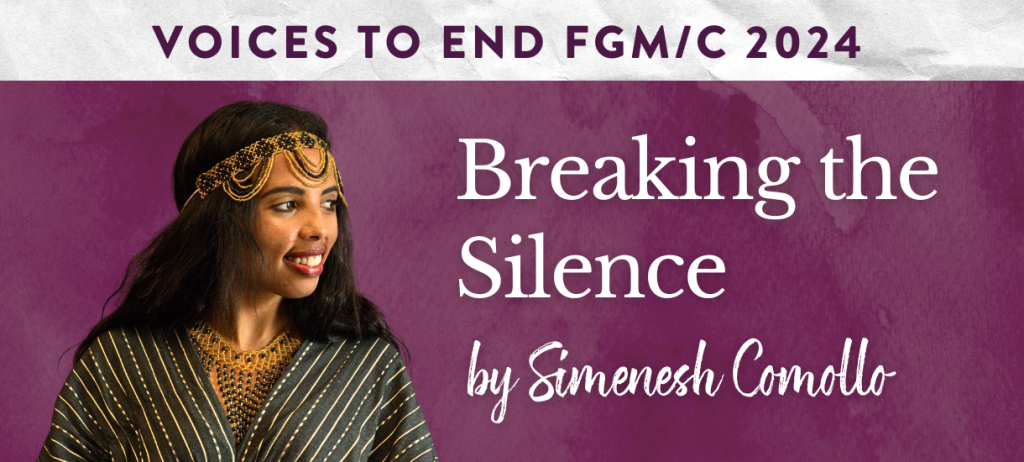
Why did you want to attend the workshop and share your story? I wanted to attend the workshop because I recognized it as a unique opportunity to share my journey with FGM/C, a silent struggle I had endured for years. The workshop offered a platform for me to break that silence, connect with others, and contribute to a movement aimed at ending this practice. I felt that in sharing my story, I could help raise awareness and inspire others to join the movement to end FGM/C. What story did you choose to tell and create into a digital story? I chose to tell my personal story as a survivor of FGM/C. This experience had been a dormant part of my life, until about two years ago when I encountered discussions about FGM/C in an American context. Since then, my involvement with organizations dedicated to ending FGM/C has allowed me to begin addressing the scars and pain of my own past. My digital story captures this journey of healing, advocacy, and the steps I’ve taken to raise awareness and give support to other survivors. What have you learned or most enjoyed during the workshop and by meeting others who shared their stories? During the workshop, I learned the power of vulnerability and the strength that comes from sharing personal stories. Meeting others who shared their experiences with FGM/C was profoundly healing and empowering for me. Hearing from other survivors helped to create a sense of community and solidarity, reinforcing the importance of collective action in advocating for change on this issue. The part of the workshop I enjoyed the most was the connections I made with the other participants and the support we were able to give each other within our shared mission to uplift our voices and end this practice. What kind of impact would you like your story to have? I hope my story will break the silence and shame surrounding FGM/C, and encourage more open conversations on the issue. I aim to inspire legislative changes in order to help end this practice and provide safe havens for those who are affected by it. Additionally, I want to connect with other survivors, offering them support and a sense of community. Ultimately, I hope my story will educate and foster awareness, driving more people to join the movement against FGM/C. Is there anything in your digital story that you would like to share? In my digital story, I highlight my journey from silent suffering to active advocacy. I share my involvement with organizations dedicated to ending FGM, the healing process I’ve undergone, and my renewed determination to speak out against this practice. This story is not just about my pain but about my growth and commitment to making a difference. I hope it resonates with others and encourages them to take action too. [youtube url=”https://youtu.be/BEq1SkYRZTc”] Simenesh Comollo is a domestic violence advisor for the Connecticut Coalition Against Domestic Violence. In this role, she provides support, guidance, and resources to individuals affected by domestic violence, helping them navigate complex situations and access the help they need. Alongside her work, she is pursuing a graduate degree in social work, where she is learning to further enhance her skills and knowledge to better serve her community. Her journey to the United States began when she was adopted at the age of 14, and she has now spent 14 years here. This experience has shaped her perspective and fueled her dedication to advocacy and social justice. She is particularly passionate about human rights, with a strong focus on addressing and preventing gender-based
My Story, My Voice
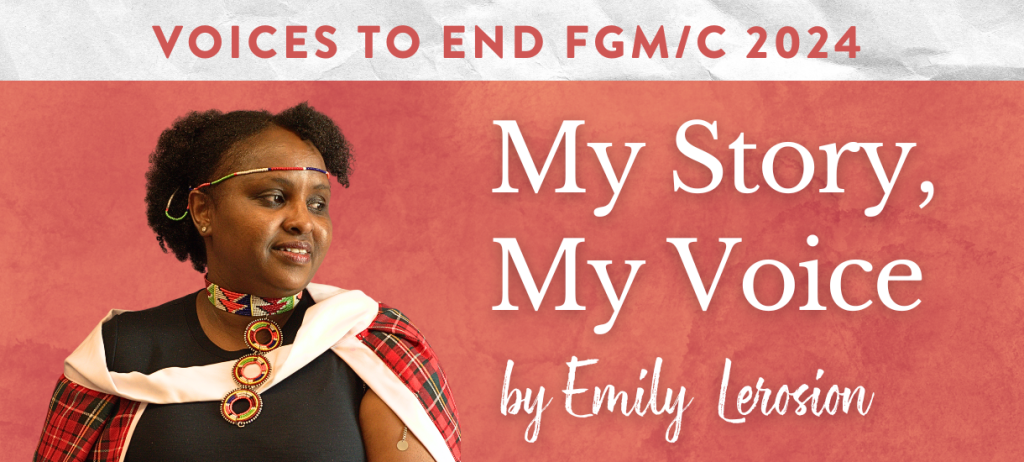
Why did you want to attend the workshop and share your story? I was interested in attending the workshop as it was the first one that I had come across that focused on survivors of FGM/C. I wanted to connect with other survivors and hear their stories, while also being able to share my own story with other survivors as well. I felt like it was going to be a journey for my healing process, which is still ongoing. I wanted to share my story with the world so people can start to understand how this practice can affect a person both physically and mentally, I also wanted to share my story to help others. I’ve been an activist for years and had spoken against other topics, like arranged marriages for young girls and other horrible things, but never about FGM/C – never my personal story. Many of the young girls I try to help don’t always understand that I was in a similar situation to them and that I really know how they feel. That’s another reason why I wanted to speak out – to make the young girls I help feel seen and heard. What story did you choose to tell and create into a digital story? I spoke about my experience with FGM/C and how I went through it unknowingly. I was around 12 or 13 years old when it happened. I spoke about the process of it – the pain of it, and the embarrassment of being exposed as a teenager to a group of adult women like that. Then later the misplaced excitement as my community told me that being cut was something to be proud of. It would not be until much later in my life that I would realize what was taken from me, that I would fully understand the scope and depth of my trauma. It felt embarrassing to speak about it for many years. Due to the fact that I was just beginning to come to terms with what had happened and because I was fearful of reactions from my community. I knew that if I spoke out against FGM/C, I would be criticized by both my community and those outside of it who did not understand the complexity of FGM/C. I was living in denial really, of what happened to me, and I came to this realization that if I kept it inside, I would never heal from it. So that’s [another reason] why I decided to share my story –to ensure that I get some healing. What have you learned or most enjoyed during the workshop and by meeting others who have shared their stories? It was one of the best workshops I’ve had in several years. I’ve gone to other workshops where people just meet and they share powerful stories, but these ones were really impactful to me. The fact that these women have been deprived of their rights, but are still standing strong and coming out against the practice. It gave me a lot of strength and courage. Being able to mingle and talk with these women and create a bond of love and sisterhood between us was one of the most powerful parts of the workshop for me. I think the workshop has [also] helped me be more open to sharing my story with others. Before the workshop, I would just speak up against other forms of gender-based violence, even though I knew that FGM/C was wrong. Now after the workshop and speaking with other survivors, I feel more comfortable speaking on the topic. However I’m still on my healing journey. I’m not 100% comfortable sharing my experience with everyone, particularly my brother and my community. Sometimes I worry about how they will react to my story once it’s out there – what will they say? But I also know that the more I tell the story, the easier it will get. That’s why I hope that the digital story will help me [explore] other platforms and connect me to other organizations also fighting this practice. What kind of impact would you like your story to have? I want my story to open up the eyes of communities that still practice FGM/C and [shed light on] the effects and how traumatizing practice can be. When people look at us, we [seem] physically okay. We are driving, we are doctors, we are whatever…but something deep inside has been affected, been taken, and we need to acknowledge that. When you get to sit down with a woman that has gone through FGM/C, she may just burst out into tears when she tells you what she’s gone through because it has been buried deep within. So I would love my story to expose the emotional harm of the practice, and to give others an idea of how FGM/C affects a survivor for the rest of their lives. For example, going through the practice can make it difficult to form connections and relationships, because of embarrassment, sexual discomfort. In some cases, FGM/C makes it diffcult for women to have children. I will always feel that FGM/C took away my voice. It made me feel like I could not speak up boldly anymore. Now that I have shared my story, I feel more confident in helping others who have been through the practice. I would want my story to empower people out there to speak up as well. Is there anything from your digital story that you would like to share here? Yes, I would like to talk about the person who is the reason for me being able to share my story in the first place– my partner. He’s always been very supportive of me and my work, [and] he’s been a really positive force in my life. So when I heard about the workshop I told him about it. I was a little hesitant to attend, but he really convinced me to go and he encouraged me to
Perseverance and Power
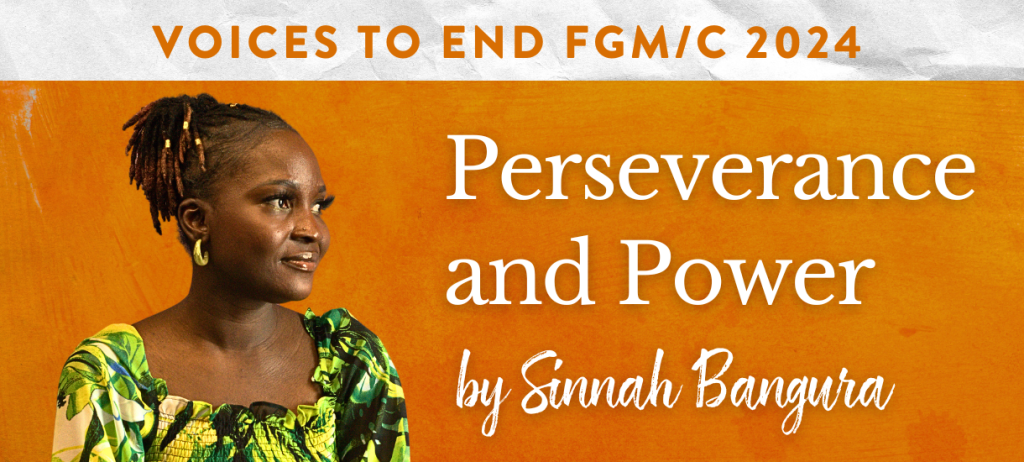
By Sinnah Bangura After I had my daughter, I was introduced to a support group with other survivors of FGC. I found a YouTube video where a survivor was speaking about her experience undergoing the practice and the impact it’s had on her life. It was at this point that I began to understand more about what had happened. In the support group, we talked about a variety of different topics like the impact of FGC, how to talk about the practice to other people who may not know what FGC is, and how FGC impacts motherhood. It was in the support group that I also began to learn about clitoral restoration surgery and the benefits of the procedure. I had my surgery done in California with Dr. Bowers, for which I will forever be grateful. After finding out about the support group, being welcomed with open arms, and being offered a safe space, I found the courage to talk about my story. When the opportunity to open up about my story with Sahiyo came up, I was up for it and willing to share my story again. I wanted to speak out and raise awareness about the surgery. I wanted my fellow sisters to know that there is a surgery out there and that anything is possible no matter what you’ve gone through. It’s not where you’ve been but where you’re going. I was also excited about coming together with my fellow survivors and sharing our stories, as well as bonding with them over our shared experiences. When I went through FGC, something was taken away and I was determined to find a solution. The surgery has had a huge impact on my healing journey; it has allowed me to feel more confident, made it easier for me to speak out about my experience, and made me determined to tell others about it and its benefits. In addition to sharing stories, what I most enjoyed during the workshop was bonding with my fellow survivors. I really enjoyed the dinner that fellow storytellers, Rufo, LP, and I went to at an Indian restaurant. The food was really great and I learned a thing or two about India. Also, I enjoyed the workshop itself – everybody coming together, talking to one another, and shedding some tears about our experiences. I enjoyed working with the Sahiyo, Silence Speaks, and Asian Women’s Shelter staff, too; they were amazing, assisting us through our storytelling and editing process. I want to raise awareness and help end this harmful practice. I want my story to give my fellow survivors the courage to speak out about their experiences so they too can start the process of healing. That is the only way I believe change will happen. I wholeheartedly believe that one day this practice will come to an end. [youtube url=”https://youtu.be/KTESPpqeKH4″] Sinnah Bangura, a dedicated Generation Hope Scholar, a nonprofit organization that advocate for student parents nationally & help teen parents thrive in college. A wife, and parent from Sierra Leone, is currently pursuing her Associate in Education. With three children—Romeo, Layla, and Omar— she balances her studies while looking forward to transferring to university for a degree in Education. Sinnah is driven by a passion to share her story with the world, aiming to raise awareness and help end harmful practices. She is particularly eager to discuss her journey, including her surgery, with fellow survivors, offering hope and information about available options. Sinnah finds joy in creativity, especially through music and dance, and she approaches life with a strong enthusiasm for continuous learning.
To Speak
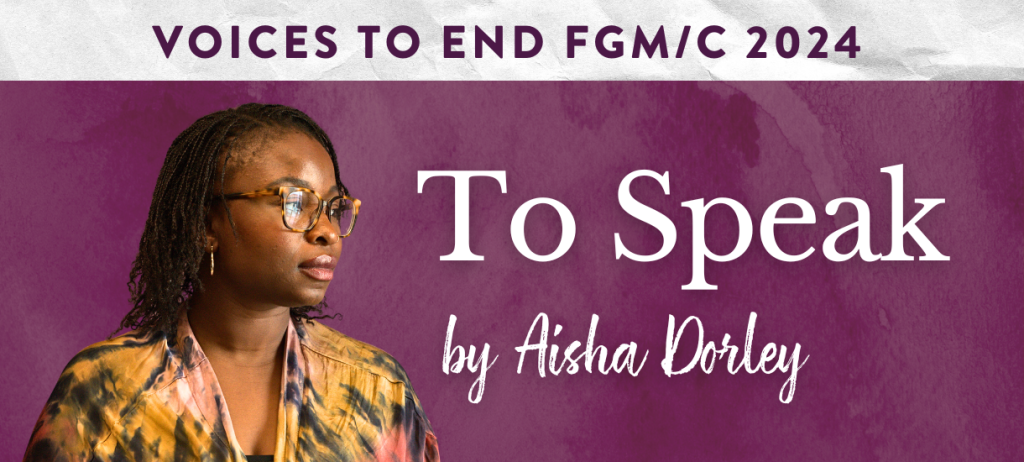
By Aisha Dorley I first came across the Voices to END FGM/C platform in the fall of 2022. The videos were so personal, vulnerable, and gripping. At the same time, they were educational in a way that no article or research paper could be. When I was presented with the opportunity to attend the workshop, I was a little hesitant at first because I was not a survivor of FGM/C. However, I later came to the realization that as an advocate from a practicing community, my voice could also make a difference in this movement. Although I have never undergone FGM/C, the issue has still affected my life.I chose to share the story that was most profound to me about my aunt, who went through FGM/C. I spoke about the emotional and psychological consequences she still endures after undergoing the cut nearly 40 years ago. I enjoyed meeting and getting to know the other participants in the workshop as well. The environment was so supportive and creative. Working with the other women put my mind at ease, and made me feel like I belonged in the space. I hope that my story can help others to find their voice and speak up. Especially those like me, who come from a practicing community and do not know how they can help or make a difference. I would like for my story to start the conversation within our families that can lead to incremental, but critical, change. [youtube url=”https://youtu.be/05dIG8n44ps”] Aisha Dorley is a public health professional with a passion for women’s health and well-being. She holds a masters in public health with a specialization in maternal child health. She channels her expertise towards ensuring the highest standards of care for women and children. Aisha’s career is fueled by a passion to advocate for health equity, striving to bridge gaps in healthcare access and outcomes. Beyond her professional endeavors, she actively engages in community outreach and education initiatives, aiming to empower individuals with knowledge for healthier lifestyles. Aisha Dorley exemplifies a steadfast commitment to improving public health through education, advocacy, and compassionate care.
On My Own Terms
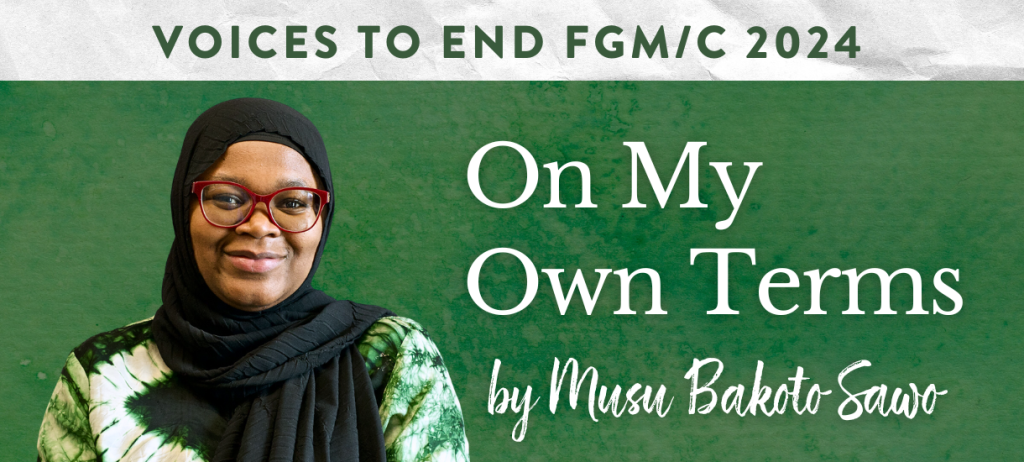
Why did you want to attend the workshop and share your story? I’ve had the opportunity to talk about my experience with female genital mutilation (FGM) and the ways in which it has impacted my life and my community. However, finding a platform that allows me to take ownership of my story—and have autonomy and control over the things that I share—is rare. So, when I heard about this opportunity, I thought it was amazing that there was a workshop where I could tell my story on my own terms. What story did you choose to tell and create into a digital story? My story was told in multiple parts. I talked about how FGM affects sexual intimacy; how it led me to become a child’s rights activist; and how it has shaped my work as a human rights advocate. My story also reflects how I see FGM as something that does not define me because there are so many other wonderful aspects of my life. I don’t like being called a victim because I’m not—I am a survivor, that’s how I define myself. I have gone on in life to achieve amazing things. I was part of the movement that led to the ban on FGM in The Gambia, and continue to be involved in protecting this ban. More recently, I have been involved in efforts to maintain the ban when it was threatened with repeal by Parliament. While this effort was successful, there is still more work to be done. We need to ensure the law remains in place to prevent a reoccurrence of the challenges we faced in the past several months. Additionally, we need to make sure that the law is fully implemented and enforced while continuously engaging with communities on the importance of sustaining the law. What have you learned or most enjoyed during the workshop and by meeting others who shared their stories? What I enjoyed the most about the workshop was the safe space created for us. This was particularly important to me because, although most of us were survivors of FGM, our experiences and stories were different. I was glad that we could all talk about our journeys on our own terms. I also appreciated the welcoming environment, which allowed everyone, including non-survivors, to share their voices. This openness, I believe, made it comfortable and safe for everyone to be vulnerable and share their thoughts and feelings. It’s like we created our own community as we held space for one another while bearing witness to each other’s stories as they were told. I also appreciated and valued the accommodations made to ensure that all participants had the best possible experience. It’s things like this that made the workshop a special and meaningful space to be a part of. What kind of impact would you like your story to have? I want people to start looking at survivors as people who have a voice—as people who have the right to share their stories and deserve to do so with dignity on their own terms. I also hope to inspire more people to get involved in the advocacy to end FGM. Through my story, I want people to understand the life-changing impact this practice has on women and girls. I want others to recognize the irreparable harm it causes in many different ways and understand why this practice must end. Is there anything in your digital story that you would like to share? I’d like to share this: if we don’t take an intersectional approach in addressing FGM, we risk perpetuating even more problems and causing significant harm. For example, if the ban against FGM in The Gambia can be threatened, so can other laws prohibiting gender and sexual violance, such as the anti-child marriage law. We need to ensure that when we talk about FGM, we frame it within the broader context of all other forms of gender-based violence and oppression because, in many ways, they are all interconnected. [youtube url=”https://youtu.be/uUb7zrdjwXE”] Musu Bakoto Sawo is a feminist human rights lawyer with over 18 years of experience in children’s and women’s rights advocacy and activism. She holds a Master of Laws in Human Rights and Democratization in Africa and a Master of Global Affairs in International Peace Studies and Gender Studies. With over 10 years of leadership experience in program and policy development, advocacy, and fundraising, Musu has made significant contributions to non-profit organizations as well as public institutions in The Gambia and across the African continent. Musu is also the recipient of numerous international and African human rights awards, including the 2018 Commonwealth Points of Light from Her Late Majesty Queen Elizabeth II; the 2020 Daily Trust African of the Year; and the Vera Chirwa Award from the Center for Human Rights at the University of Pretoria, South Africa. All these awards recognize her work for women and girls in The Gambia and beyond, particularly in relation to harmful traditional practices such as female genital mutilation (FGM). Her advocacy efforts contributed to the enactment of the legislation that banned both FGM and child marriage in The Gambia.
I Am SORRY!
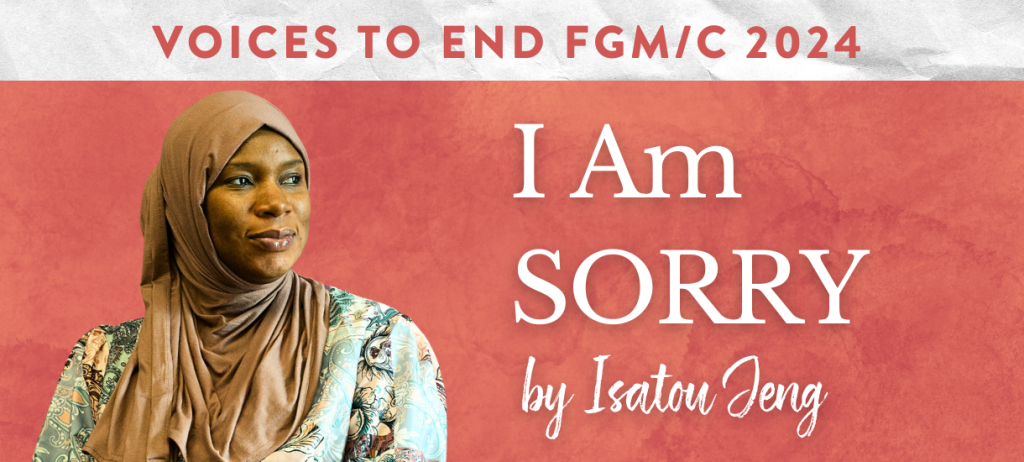
By Isatou Jeng For over a decade, I have used my voice and my story as a survivor of FGM/C to raise awareness around the issue. I started at a time when it was considered too “shameful” to share my personal experience as a survivor. I am glad that I shared my story regardless, though, as it emboldened many other survivors to share their stories and experiences publicly as well. Collectively, all of us survivors who spoke up ultimately led to a ban on FGM/C in The Gambia in 2015. I know the power of storytelling, which is also what attracted me to attend the 2024 Voices to End FGM/C workshop. This is the story I chose to share: Over the phone, one of my cousins informed me that they had cut my daughter and she added, “But she is doing fine, you don’t have to worry.” I couldn’t say a word as tears rolled down my face, knowing that I had failed my child. It took me over 15 years to share this part of my story with anyone – not even those closest to me knew about this part of my life. My daughter and I talked over it several times and I have asked for her forgiveness. She did forgive me, but it is I who is still unable to heal. For over a decade, I have helped save so many girls from FGM/C, but I was unable to protect my child. It hurts and I am not sure if I will ever heal from it. The workshop has been an incredible experience for me. I have shared my story over the years with others but not digitally. I was able to create and edit my story with the help of amazing facilitators who were always happy to provide support. It was also great to be in the same space with other storytellers who made it feel like we were a family. I felt safe and supported throughout the process and I am glad to be in the same community with champions who are all passionately working to end FGM/C. I want my story to reach all corners of the world and be a tool for change. I hope it serves as a call for other survivors to speak out and share their stories as we work together to end FGM/C and protect women and girls. I won’t ever get tired of apologizing to my daughter. I wish I was there to protect her. I wish she was never cut. It is heartbreaking knowing she is going to live the scar for the rest of her life. All I can say is “I am sorry!” [youtube url=”https://youtu.be/oi2OpeM1urU”] Isatou Jeng is a program management specialist with 13 years of experience and diverse skills in social justice, youth development, human rights advocacy, and campaigns in the non-profit sector. She has dedicated her life to ending all forms of gender-based violence and her work contributed to the criminalization of FGM/C in the Gambia in 2015. Now with The U.S. End FGM/C Network, Isatou is working with survivors, activists, and allies to end FGM/C in the US and globally.
My Journey to Advocacy
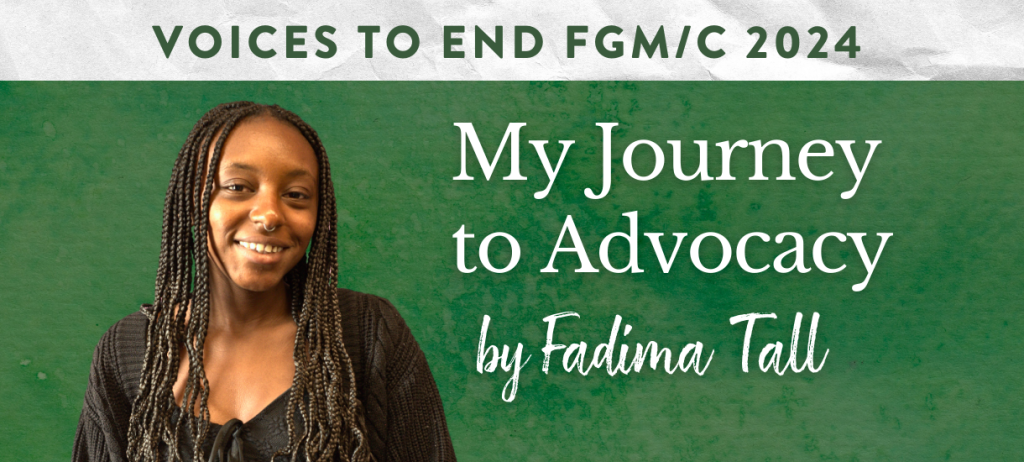
By Fadima Tall When I was invited to join the Sahiyo Voices to End FGM/C workshop, I was hesitant to accept. I had only been in the field of FGM/C advocacy for a few months and was still finding my footing as an advocate. I had always struggled with speaking about emotional topics, perhaps as a result of some deep-seated fear of opening up to people. More importantly, I didn’t know if I deserved to be included in a space that was for survivors of FGM/C, which I am not. I pondered deeply about what my role would be in the workshop and what I would have to offer the group, but I drew a blank. Though I knew that other advocates would also be there, there was still a part of me that still felt unworthy of participating in the workshop. Coming into the first virtual meeting I did not know what to expect from the group, but as we started to get to know each other I finally realized that I had nothing to worry about. Everyone was so welcoming and I saw myself reflected in every single person in that space. While I at first thought I was intruding on a safe space for women who have experienced something I haven’t, it turned out to be the community I never knew I needed. Over the next few weeks, my excitement about the in-person workshop continued to grow. After hearing these women bravely open up and tell us their stories of being cut, I gained the courage to travel with them on this storytelling journey as a supporter, advocate, and more importantly, as a friend. Because these women shared their stories with me, I learned so much about the practice that I hadn’t known, even as an advocate. Everyone’s story of FGM/C is different and every story can teach us something new about the pain that is caused by this practice. Through the workshop, not only did I learn about FGM/C but I also built amazing relationships with the workshop participants. These are friendships that I will cherish forever. I am endlessly inspired by the strength, kindness, and radiance I saw in all of these women and I am immensely grateful for the opportunity to have shared this experience with them. Though my story is not the same, I shared it in the hopes that other non-survivors could see what it looks like to become an advocate. It is not a linear journey and it looks different for everyone, but what we all share is a genuine love and care for the women and girls in our communities who are at risk or have experienced FGM/C. The story I shared for the workshop starts with me as a young girl beginning to understand that I live in a world that doesn’t value me for who I am, but instead for what I can offer the men around me. I shared moments in my life when I began to understand what FGM/C is and when I realized I needed to be an advocate against it. That story is only beginning, as I continue to grow every day as an advocate. I can only hope that my story has an impact on other aspiring advocates and shows people that anyone can do this important work and that everyone should. The Voices to End FGM/C workshop is an experience I am immeasurably grateful to have been a part of and I hope all of our stories shared there will inspire others to become advocates and encourage survivors to share their stories as well. [youtube url=”https://youtu.be/VqBHTpaB21Y”] Fadima Tall is originally from Cameroon and Mali but spent her formative years in Ethiopia. Currently serving as the Policy Research Associate at the US End FGM/C Network, she began her advocacy journey against FGM/C within the organization. Her deep interest in gender issues in Africa drives her pursuit of a PhD in International Relations at American University starting this Fall. Fadima is eagerly looking forward to participating in an upcoming workshop where she hopes to learn from FGM/C survivors and further develop her advocacy skills. She is also keen on improving her storytelling abilities through the workshop, recognizing its importance in amplifying voices and effecting change. Outside of her professional endeavors, Fadima finds creative fulfillment in art, particularly drawing and painting, which she enjoys in her free time.
